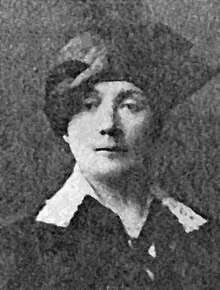Ecaterina Arbore
Ecaterina Arbore ( Russian Екатерина Арборе ; born October 16, 1875 in Geneva , † December 2, 1937 in Tiraspol ) was a Romanian - Soviet doctor , writer and politician .
Life
Arbore was the daughter of the writer and journalist Zamfir Ralli-Arbore , who took Romanian citizenship in 1879. Her Greek great-grandfather Samfir Ralli took in Alexander Pushkin , who was exiled to Bessarabia, in his Bessarabian country estate Dolna ( Rajon Strășeni ) in 1821 . She studied at the Medical Faculty of the University of Bucharest . After studying at the Pasteur Institute in Paris , she spent two years studying at the Medical and Surgical Academy in St. Petersburg .
After graduating, Arbore worked in a hospital for orphans in Bucharest . She dealt with problems of industrial hygiene and the spread of tuberculosis among workers and advocated the organization of countermeasures. In 1907 she published her first Romanian paper on the health of industrial workers. She worked with the editorial offices of the România muncitoare newspaper and the Amicul copiilor magazine , and published revolutionary articles in the Красная Бессарабия (Krasnaia Bessarabia - din rusă Basarabia Roșie) magazine .
Arbore had already joined the socialist movement during his student days. In 1903 she was in the executive committee of the Partidul Socialist din România (PSR) to prepare for the VI. Elected to the 1904 Congress of the Second International . She led a campaign for social security for industrial workers threatened with tuberculosis. After the October Revolution she was sent to Soviet Russia and joined the Communist Party of Russia (B) in 1919 . She worked as a journalist and in the health service of the Ukrainian Soviet Socialist Republic and studied at the Communist University of the National Minorities of the West in Petrograd . She was in contact with Vladimir Galaktionovich Korolenko . She then returned to Romania , was arrested and expelled in 1924.
Arbore participated as a delegate of the Romanian Communist Party (KPR) at the 5th Comintern World Congress in 1924. It was in the Revolutionary Committee of the Moldavian Autonomous Soviet Socialist Republic elected (ASSR) and Vice national commissioner for health care and the People's Commissioner for Workers 'and Peasants' Inspection of the Moldavian ASSR. In the late 1920s she was suspected of Trotskyism and lost her offices. In 1929 she was visited by the writer Panait Istrati and paid tribute to her services to health care. In 1931 she took part in the 5th Congress of the KPR Abroad in Moscow and Kharkov .
On September 20, 1937, during the Great Terror , Arbore was arrested and sentenced to immediate death by shooting on December 2, 1937 by the NKVD Troika under Article 58 of the Criminal Code of the RSFSR . In 1968 she was rehabilitated by the Soviet authorities and also by the Romanian authorities, with Nicolae Ceaușescu condemning the Soviet measures at the time.
The painter Nina Arbore was Arbor's younger sister.
Web links
- Literature by and about Ecaterina Arbore in the bibliographic database WorldCat
- Catalog of the Russian National Library : Арборе, Екатерина
Individual evidence
- ↑ a b c d e f Молдаване или Румыны? Взаимоотношения между бессарабцами и румынскими политэмигрантами накануне создания Солдавской Retrieved on March 15, 2020 Солдавской .
- ↑ Henri R. Steel : Gânditori şi de curente istorie Socială Românească, Cap. VII: "Curentul gândirii socialiste" (accessed March 15, 2020).
- ↑ Дик И. И .: Встреча с отцом . Дет. лит., Moscow 1985.
| personal data | |
|---|---|
| SURNAME | Arbore, Ecaterina |
| ALTERNATIVE NAMES | Арборе, Екатерина (Russian) |
| BRIEF DESCRIPTION | Romanian-Soviet medic, writer and politician |
| DATE OF BIRTH | October 16, 1875 |
| PLACE OF BIRTH | Geneva |
| DATE OF DEATH | December 2, 1937 |
| Place of death | Tiraspol |
